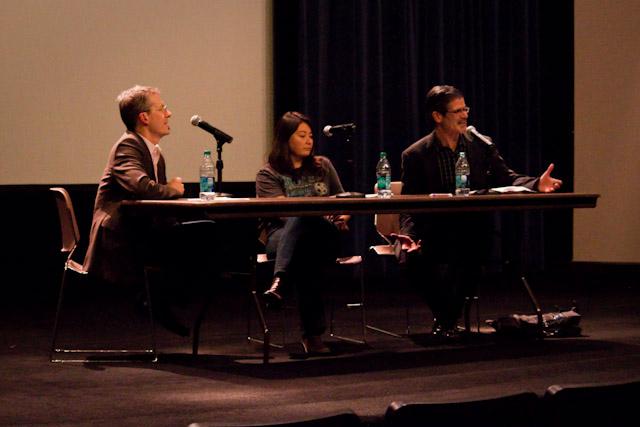
A three-week film series sponsored by the art history department kicked off Monday in the Hughes-Trigg Theater. The movies are from the 1900s and were originally produced for all-black audiences. (Kathleen Strauss/The Daily Campus)
Eighty year-old Maryam Abdullah sat watching a movie in the Hughes-Trigg Theater but could not believe her eyes.
In the 1940s, Abdullah was a teenage girl, picking cotton, cutting wood and earning nearly fifty cents a day for her work.
In her Tyler, Texas community, seeing movies was a luxury she didn’t have.
“There was no electricity,” Abdullah said, her eyeglasses perched at the tip of her nose. “Not in the little slave camps I grew up in.”
Abdullah and about 20 more audience members attended the first of a three-week event called the RASC/a Film Series Monday night.
The series, sponsored by SMU’s art history department, showcases three movies from the early 1900s, produced originally for an all-black audience starring all black actors.
Films that fit this description were called “race films.”
“These films are a way of seeing how African American audiences wanted to see themselves portrayed on film,” Lisa Kaselak, assistant professor of film at SMU, said.
Of the 500 “race films” producd, only 100 remain, and SMU possesses 15.
Now that they are restored, Janis Bergman, associate professor and chair of the art history department, felt these films needed to be shared with the community.
“There are maybe no more copies of these movies in existence,” Bergman said.
The first in the series was “The Blood of Jesus,” written, directed and starring African American actor and filmmaker Spencer Williams in 1941.
The film concerns the accidental shooting of a woman by her husband and how faith in God brought her back to life.
After the movie, there was a panel consisting of Kaselak and Robert Tajeda, professor of art history at SMU, and was moderated by KERA’s Jeff Whittington.
Although most of the crowd consisted of older adults, some thought college students could learn a lot from watching the film.
“The media was dominated by the white people who had money in this time period,” Kaselak said. “It’s great for students to learn the full history, not just the abridged one.”
Whittington felt that panel discussions like these are just what the country needs.
“It’s important that we talk about the issues that both haunt our country and our existence in society to be able to grow as people,” Whittington said.
Next week, the film series will feature another Spencer Williams film called “Dirty Gertie from Harlem U.S.A.” at 6:30 p.m. on Monday.
The movie surrounds the life of a performer in a troupe arriving at the Paradise Hotel on the island of Trinidad.









